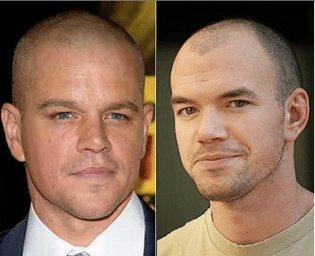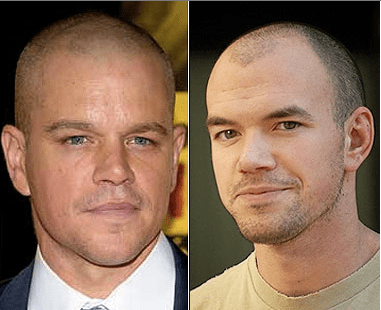
Damon and DeChristopher: dead ringers?
With last night’s totally shocking (read: not shocking at all) crowning of The Artist as last year’s best picture, we can finally say good-bye to Oscar season and months of back-patting, overwrought movies about gentle Nazis who can’t read good, or sappy, pseudo-racial vignettes that “help” Hollywood work through white guilt. Angelina Jolie’s leg will get some much-needed rest, and movie studios can get back to coming up with new ways to convince us that a weenie like Shia Labeouf can be a legitimate star. (Is he? I’ll let him answer that.)
Beyond a few second-tier parties and celebrities’ off-time advocacy, greens and green issues are not the focus of the occasion. It’s not that we haven’t had our moments: The emerald years of 2006-7 saw celebs ferried to the red carpet on briefly trendy Priuses (Prii?), and An Inconvenient Truth even brought home Oscar gold for Best Documentary and Best Song. (It was Melissa Etheridge, and no, we don’t remember how it goes, either.) Last year, the flaming faucets of Josh Fox’s Gasland got a nod, and this year, the enviro movement had another runner-up in If A Tree Falls, an ecoterrorism chronicle that bows heavily toward the Julia “Butterfly” Hill school of environmental sympathy.
That’s OK. We don’t need or want another documentary Oscar. Why? Because most people don’t really care about documentaries. I’d argue even the best documentaries carry an unmistakeable “eat-your-veggies” whiff; the ones that don’t just gloss over their message moments with lyrical cinematography or narration from a Teutonic acid journal. It’s not that there isn’t an appetite for docs among smart greens. But Sunrise Birkenstock and Antoine Von Aspiring Filmmaker have multiple opportunities to overdose on green documentaries at boutique film festivals around the country (like the San Francisco Green Film Festival happening this weekend). You can bet they’ll arrive on cruiser bikes and bring their own hand-cured seaweed strips instead of popcorn. Those people are already on board.
To make a real dent in the viewing culture, we need drama. This has been done before: Roland Emmerich’s schlocktacular The Day After Tomorrow, released in 2004, won precisely zero Oscars. But it dominated the pop-cultural conversation for months before and after its release and generated $544 million in ticket sales. And it did it with scenes like this:
Now for a second, imagine this: If half-wit teenagers outrunning lamewad monster freeze waves could inspire continual spots on the national evening news and even a comment or two from the Bush administration, what type of attention might a tense, well-written, Oscar-winning thriller bring?
Haters, before you even say it: Yes, the climate movement has dramatic stories to tell that go beyond converting the “wedges” report into eye-stabbing 3-D. As an example, we need look no further than this year’s Keystone fight. Summon your best trailer voice with me now:
- A respected author rallies thousands of people from across the country to fight an unwinnable battle against an oil pipeline that threatens our way of life. With nothing but voices, bodies, and the truth as weapons, they stare down a billion-dollar enemy, hoping to buy time by nudging impossibly corrupt institutions that are just inches away from disaster.
- In the desert Southwest, an anonymous idealist walks into a Bureau of Land Management auction and outbids crusty wildcatters to buy thousands of acres of gas-rich land adjacent to national parks with millions of dollars he doesn’t have. Seeking to make an example of him, the compromised local government sends him to jail. But instead of shutting him up, they anoint a hero who inspires a movement from behind bars.
- In a small town in the Pennsylvania hills, a widowed and impoverished father of two watches as his neighbors pull up stakes in exchange for millions of dollars and perpetual gas royalties. Eager to hold on to the hills and forests he loves but desperate to provide for his family, he holds out in hopes of wringing every last drop of blood money out of the too-nice-to-be-true drilling companies that visit his door. But the tables turn when his youngest daughter crumbles under a mysterious illness, and his faucets start dripping fire.
OK, maybe I dramatized that last one a bit. (Maybe a lot.) But the first two examples are 100 percent real, no drama added, and the particulars if not the characters of the last one are true. And they all tell part of the same story, the story of real Americans rolling in the dirt, engaged in the fight of their lives: the climate fight.
Filmmakers have and will continue to capture these real-life stories in documentary form (high-five a million angels, Josh Fox!). But Hollywood’s best and brightest could do wonders with this stuff. They should do wonders with this stuff, and not because it’s the right thing to do: They should do it so they can win Oscars and make a crapload of money.
Who could possibly take these three strands and weave them into an all-encompassing, dense meta-narrative rife with Traffic-esque tension, Out Of Sight black humor, and Erin Brockovich personal triumph? Steven Soderbergh, of course. There’s no filmmaker more suited to taking a multi-pronged political issue and boiling it down into a filter-bleached action vehicle: He made a white-knuckle flick about the war on drugs, for chrissake, and he won an Oscar doing it. His Erin Brockovich bonafides prove he can handle thorny environmental paper chases, and his obsession with accuracy in Contagion means we probably won’t have to worry about a three-day ice age or wolves hunting Jake Gyllenhaal.
We’d have to pull Soderbergh out of painterly retirement, but we can count on his green-inclined roster of regular players to put on the pressure. (Speaking of the Soderbergh players, he’s got quite the ace up his sleeve when it comes to stunt casting: Look at that photo and tell me Matt Damon wasn’t born to play Tim DeChristopher.) More than that, I bet he wouldn’t be able to resist the challenge: He gets to return to film, tackle the most important issue of our age, influence the national conversation, and win a boatload of awards in the process. That’s how my fever dream goes, anyway.
And Hollywood at large gets to bask in the glory of its own reflection by making a movie that makes a difference (which, in Hollywood, usually gets confused with making a movie about someone else who made a difference). Sure, they’ll be drunk with power and collectively more insufferable than ever before, but as long as there’s a recent natural disaster to keep Sean Penn busy, it’ll be worth it.
And then maybe we greens can watch an Oscar telecast we’re proud of, where Tar Sands: The Movie loses Best Picture to some navel-gazing pap about an idiot savant who overcomes adversity to direct a silent film. But Soderbergh takes director and adapted screenplay, Damon nabs Actor in a Leading Role, and Clooney gets his second Supporting Actor trophy for his understated yet relatable portrayal of Bill McKibben.
What? The resemblance is uncanny.



